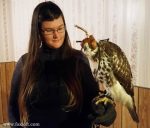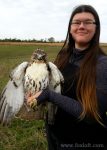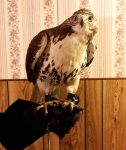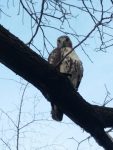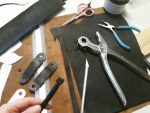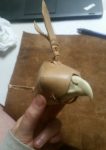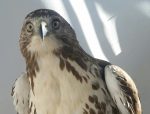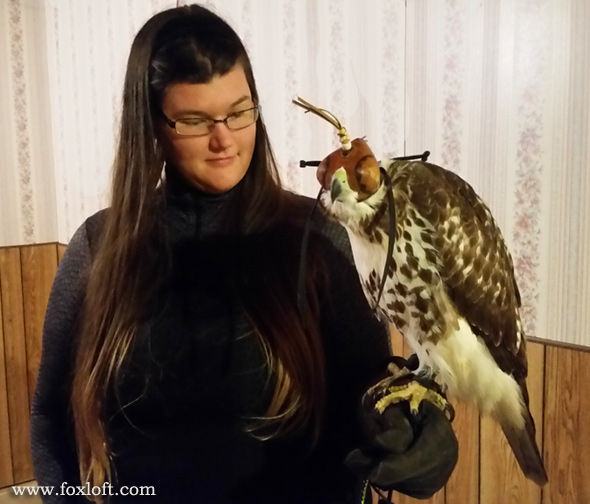 |
Falconry is, at its heart, a hunting sport. It is the hunting of small game using a raptor (bird of prey).
It is a heavily regulated sport - there is an intensive process of testing, permitting, inspections, and apprenticeship involved in getting started with the hobby. The best way to learn about falconry and see if this sport is right for you is to get in contact with your state's falconry organization, which can be found through a quick web search. They will be able to get you more information on your local regulations. |
As a disclaimer, I am in no way a falconry expert, just a falconer who loves the hobby and gets asked a lot of questions about getting started and resources for further information, so I've compiled a few to share.
If you are interested in becoming a falconer and are curious what the process looks like, and what is involved in caring for a bird, I will offer a very rough guideline (based on the process for my state of Minnesota). Your local DNR (Department of Natural Resources) Falconry Coordinator and state falconry club can give you further details, and would be your first points of contact.
- Contact your state coordinator for more information on regulations and a falconry licensing 'packet'. Some of this may be available to look at online via your state DNR website.
- Contact your local falconry club to inquire about joining in on a meeting or hunt.
- Think hard about if you have the time, resources, and energy available for the daily and long-term commitment to a bird and hunting.
- Purchase some basic books on falconry to learn about what is required and prepare for the test. The test is about raptor care, health, legal falconry and hunting regulations, history, terminology, and taxonomy/natural history. As a for instance, the main study material book is over 1000 pages long.
- Find a falconer who is willing to mentor you. Falconry has a mandatory apprentice period with a minimum of two years under an experienced falconer. Many ask that you spend some seasons hunting with them and being involved in the sport before they will consider taking you on as an apprentice. If you don't have the time to do that, you definitely wouldn't have the time for your own bird. Since the apprenticeship is so long and involved, it's not a trivial favor to ask of someone.
- Study for and pass the written falconry license exam, administered by your state DNR.
- If you pass your test, you can begin work on your mews (hawk house), and purchase or make all of the required equipment for your bird's handling, health, and safety. The most minimum cost for all necessary items would be around $1500-2000, and can easily go up from there. There are also the costs of hunting licenses and feeding your bird, as well as potential specialty vet care and replacement equipment. It is not an inexpensive or budget hobby.
- Pass a state inspection checking your enclosure and equipment.
- With your completed test, inspection, and letter from your mentor in hand, apply for your falconry permit.
- If your permit is issued, you will be able to trap your first bird with the help of your mentor, during legal falconry raptor trapping season. In Minnesota, your first bird must be a passage (a first year bird that has left it's parents and is independent but young) red-tailed hawk. It is the same for most states, but a few have other options as well.
Caring for a raptor is a constant commitment. They need to be fed daily (there will be rodents and wild, hunted critters in your freezer), their weight and health checked daily, hunted regularly during the legal season, and exercised outside of that. The falconry apprenticeship and licensing system is set up to ensure the health and safety of these amazing creatures, and to weed out people who don't have the time or drive necessary to keep and hunt with these birds. It is open to any U.S. citizen, but it is difficult and time consuming by it's nature. Working your way through, being patient with, and understanding the licensing system is part of the whole process.
There are some other considerations involved before getting started with falconry.
- Applicants must be at least 12 years old, or older in some states. If the applicant is not legally an adult, a parent or guardian must take responsibility for the bird as well.
- Falconry birds are not pets and are rarely in any way 'affectionate'. They learn that you are smart to work with because you provide a meal if they do not catch one, and you help them hunt, but they do not love you, bond with you, or want to cuddle. You are hunting partners, not necessarily friends.
- You must enjoy hunting and being outdoors, even if the weather is uncomfortable or unpleasant. Your bird needs to hunt very regularly and in Minnesota, the hunting season is in the depths of winter. It can be miserable slogging through hip deep snow and brambles looking for rabbits, but it is as much a part of the sport as the (rare here) beautiful, sunny season days.
- You must enjoy learning and working with animals. You do not force your bird to work with you, you apply positive reinforcement training methods to teach it that partnering with you (instead of just fleeing and being gone forever, which is their natural state) is beneficial to them. This is a time consuming process that requires patience, and the whole sport is one in which you are constantly learning new things.
This is the number one book I'd recommend to get started with - since most falconers would start with a red-tailed hawk. It goes through the process of acquiring, training, and hunting with a bird in a concise but thorough manner.
Above is the falconry exam 'study guide'. It is a very comprehensive collection of articles about all sorts of falconry history, training methods, species profiles, and much more.
A shorter but good, concise book about starting falconry with a red-tailed hawk.
Useful Links:
The Modern Apprentice